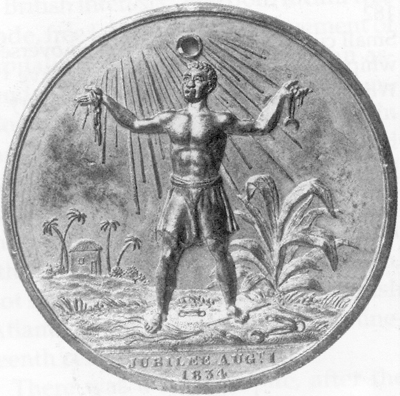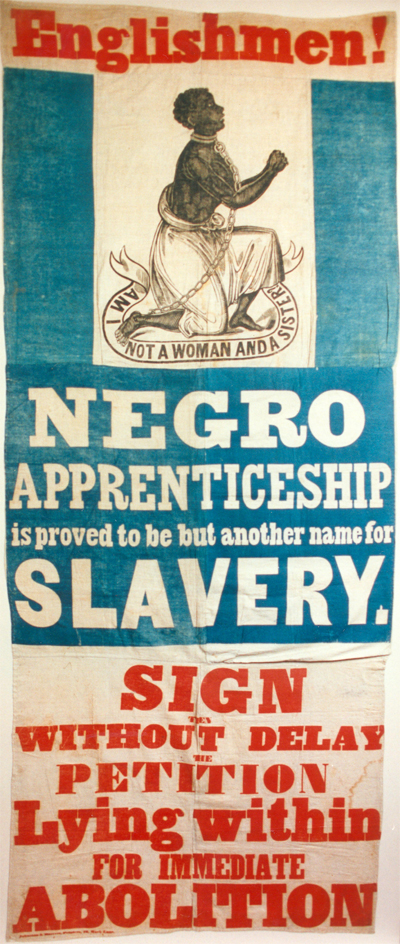|
Abolition and Emancipation
"It is high time to resort to other measures…too much time has already been lost in declamation and argument…the cause for emancipation calls for something more decisive, more efficient than words." "
Elizabeth Heyrick
|
Background
Although the Abolition of the Slave Trade Act 1807 appeared on paper to end the trafficking in Africans, it did not end enslavement in the Caribbean. Despite efforts made by the British Navy to suppress the trade in Africans, slavers found ways to bypass the law, including trading with nations who had passed no such legislation. The men who were liberated from slaving vessels by the British often found themselves conscripted into the Navy for up to 14 years rather than being sent back to their homelands.
The rebellions in the Caribbean did not abate in the period between 1807 and 1838. In Barbados in 1816, an armed struggle was led by an African born enslaved man called Bussa who was head ranger on a plantation. Bussa believed that the island’s General Assembly were opposing English efforts to have them freed, and that therefore they ought to fight for their freedom.
|
 Medal commemorating the Emancipation in 1834
© Anti-Slavery International
| |
In Britain, women had added a more radical voice to the anti-slavery campaign, and called for immediate abolition. Elizabeth Heyrick, in her pamphlet Immediate not gradual abolition (1824) argued that "the perpetuation of slavery in our West India colonies is not an abstract question, to be settled between the government and the planters; it is one in which we are all implicated, we are all guilty of supporting and perpetuating slavery. The West Indian planter and the people of this country stand in the same moral relation to each other as the thief and receiver of stolen goods".
The Peckham Ladies Anti Slavery Society wrote a pamphlet advocating the use of East Indian sugar rather than West Indian slave produced sugar.
| |
Slavery remained so profitable, that plantation owners to put economic interests above moral criticism. They reluctantly accepted amelioration policies put forward by the government –
"Slaves shall have one day in every fortnight, except in crop time, but at least 26 days in the year called Negro days, to cultivate their grounds, exclusive of Sundays, under penalty of £20", was one of the clauses in An abstract of the British West Indian Statutes for the Protection and Government of Slaves.
In England the pamphlets chronicling the true state of slavery in the Caribbean continued to be published, criticising the morals of the planters, and their treatment of the enslaved, and detailing runaways and small uprisings. The Rev. R. Bickell, commenting on the planters’ frustration at the number of rebellions said, that "the general cry in Jamaica seems to be that the members of the African and Anti Slavery Societies and their agents, have been the cause, by impressing on the minds of the Negroes that they are free, or ought to be free".
In 1831, Mary Prince, an enslaved woman from Antigua who escaped from her owners while working in London, wrote her narrative, A history of Mary Prince, a West Indian Slave, detailing a life filled with violence, sexual abuse and endless labour.
The Baptist Rebellion led by Sam Sharpe in Jamaica during the winter of 1831-32 finally brought matters to a head. It took two weeks for the British to regain control, and property worth over a million pounds was destroyed. Fearful that Jamaica would be lost the same way that Haiti had been, an Act was passed in 1833 abolishing slavery in the British colonies. The planters successfully lobbied for compensation for ‘lost property’, and received £20 million. The enslaved received nothing. Further, they would become apprentices for a period of 4-6 years after which time they would become free. However, apprenticeship was simply slavery under another name. Heavily criticised by the anti-slavery movement, Joseph Sturge, an abolitionist from Birmingham, travelled to the Caribbean to investigate this system, proving that the African Caribbeans were still enslaved. Parliament was eventually pressured to end apprenticeship on 1st August 1838.
|
 A campaigning banner calling for the end to the apprenticeship system
© Anti-Slavery International
|
Narratives from the Collection
Information concerning the slave trade printed by order of a committee acting under the direction of the yearly meeting of the religious Society of Friends
The trials of the slave traders: Samuel Samo, Joseph Peters and William Tufft, tried in April and June 1812
A letter to William Wilberforce, vice president of the African Institution containing remarks on the reports of the Sierra Leone Company and African institution with hints respecting the means by which a universal abolition of the slave trade might be carried into effect, by Robert Thorpe Esq. chief justice of Sierra Leone and judge of the vice admiralty court in that colony (1815)
Declaration of the objects of the Liverpool society for promoting the abolition of slavery, 25th March 1823
A reply to the arguments contained in various publications recommending an equalization of the duties on East and West Indian Sugar
Case of the Vigilante, a ship employed in the slave trade; with some reflections on that traffic (London 1823)
Report of the committee managing a fund raised by some friends for the purpose of promoting African instruction with an account of a visit to the Gambia and Sierra Leone (London 1822)
An account of the emancipation of the slaves of Unity Valley Pen, in Jamaica, by David Barclay (London 1801)
Negro Apprenticeship in the British Colonies, by the Anti Slavery society (London 1838)
The permanent Laws of the Emancipated Colonies. (London 1838)
A letter W.E. Channing D.D. on the subject of the abuse of the flag of the United States in the island of Cuba, and the advantage taken of its protection in promoting the slave trade, by R.R. Madden (Boston 1839)
The Marty Rage of the United States of America with an appeal for abolition of slavery
A letter on the Slave Trade still carried on along the eastern coast of Africa
The Marquess of Sligo. A letter to the Marquess of Normanby relative to the present state of Jamaica
A narrative of events since the 1st of August 1834
West Indies. Extracts from the journal of John Candler
|
Test Your Knowledge
|

